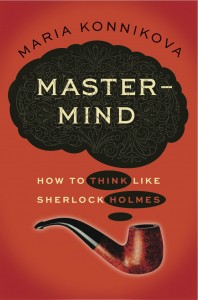In the past few years I have repeatedly read about how our ‘objective’ decisions and opinions are often influenced by completely unexpected factors. The mind is a fascinating thing. For us homeschooling moms who spend our days trying to train our children’s minds, such research and conclusions can have practical implications.
Mastermind, an analysis of research explained in terms of Arthur Conan Doyle’s mystery stories, is full of practical applications for our homeschools.
Its goal is to teach us to “…be present and mindful and to treat each choice, each problem, each situation with the care it deserves.”
And this care is not only logical. For example, we can be primed to behave in certain ways by subconscious messages that enter our senses without our knowledge. Smells, word associations, memories, the weather, and so much more can be very influential in our decisions even though we do not realize it. However, if we consciously become aware of such a potential influence, it disappears.
We can train our minds to be attentive. This is very reminiscent of Charlotte Mason’s ideas about the habit of attention. My children, who have been exposed to Charlotte Mason’s way of learning from an early age, are all able to absorb much information merely by listening. I find it very difficult to pay attention to anything without taking notes. If I wished, apparently I could still develop this habit even at my age, but currently I do not care to make that effort.
We can train our attention by learning to be selective, objective, inclusive, and engaged. Being engaged is especially important, because without that learning is much more difficult. For us homeschooling moms, that is merely a reminder that our kids will learn better if they are interested in the material and able to focus on it rather than multitasking.
We ourselves can train our minds to pay attention to what we need to by focusing on our goals. When we have actively thought about our goals, our brain is able to select what we need and to ignore what is irrelevant to us.
Using checklists and formalized structures when making decisions is our best approach to minimizing unwanted influences on our decisions.
Imagination and creativity are crucial to being able to make wise decisions. Contrary to what most people think, creativity can be taught and practiced. Another point that I’d heard about earlier with respect to scientific creativity is that lack of fear of failure is the hallmark of the creative mind. I don’t know how to eliminate fear of failure in my kids (or myself for that matter), but I know one factor is being so engaged with the subject matter that it is more important than what people think.
Various methods of distancing oneself from a problem, such as walking, music, nature, meditation, and art, promote creative solutions. So does play and curiosity. Here, again, I am reminded of Charlotte Mason’s insights.
Although habits are essential, they can contribute to mindlessness, so we must focus on keeping on learning. Did you know that our minds reward us chemically when we are learning successfully? Once the intense learning phase in any topic or skill is over, however, it takes a lot more will power to keep on learning.
Great people keep on learning and growing and embracing challenges well into old age…and this is evident in the physical structure of their brains. In fact, if we are not actively strengthening our brain’s connections we are losing them. This is even more important for children whose brains are still actively developing.
We can learn from our failures as well as our successes. Not only is this true, but having this mindset makes it even more so at a neurological level. Obviously, this is an important concept to reinforce in our children’s minds.
Because we have access to so much information, it is vital that we learn to select what information to focus on instead of allowing the flood to overwhelm us.
The way our brains act is extremely sensitive to the way we think about them.
Completely suitable for teens, Mastermind will appeal to any fan of Sherlock and of Arthur Conan Doyle’s stories. It will inspire them to think about how they think, a most useful exercise, and it gives parents some ideas about thinking that can help them in their homeschool as well as personally. I loved it.
This is yet another book in the in the 2014 52 Books in 52 Weeks Challenge and is also linked to Saturday Reviews, Works for Me Wednesdays, Booknificent Thursdays, Raising Homemakers, Finishing Strong , and Trivium Tuesdays as well as the Carnival of Homeschooling and the Charlotte Mason Carnival.


Sounds very intriguing. Thanks for the review and tying it in with Charlotte Mason’s ideas.
How intriguing that the author used Doyle’s work to illustrate this one. It sounds quite enjoyable! Thanks for sharing it at Booknificent Thursday!
Tina